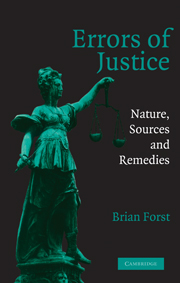Book contents
- Frontmatter
- Contents
- Preface
- Acknowledgments
- 1 The Problem
- 2 Errors of Due Process
- 3 Errors of Impunity
- 4 Frameworks for Analyzing the Incidence of Justice Errors
- 5 Assessing the Cost of Justice Errors
- 6 Standards of Evidence
- 7 Police-Induced Errors
- 8 Prosecution Policy and Justice Errors
- 9 The Jury
- 10 Sentencing and Corrections
- 11 Homicide
- 12 A Matter of Legitimacy
- Bibliography
- Index
- Titles in the series
10 - Sentencing and Corrections
Published online by Cambridge University Press: 05 July 2011
- Frontmatter
- Contents
- Preface
- Acknowledgments
- 1 The Problem
- 2 Errors of Due Process
- 3 Errors of Impunity
- 4 Frameworks for Analyzing the Incidence of Justice Errors
- 5 Assessing the Cost of Justice Errors
- 6 Standards of Evidence
- 7 Police-Induced Errors
- 8 Prosecution Policy and Justice Errors
- 9 The Jury
- 10 Sentencing and Corrections
- 11 Homicide
- 12 A Matter of Legitimacy
- Bibliography
- Index
- Titles in the series
Summary
Punishments may be too small or too great; and there are reasons for not making them too small, as well as not making them too great. The terms minimum and maximum may serve to mark the two extremes of this question, which require equal attention.
— Jeremy BenthamIntroduction
Errors of justice can be made after a defendant is convicted, even when the offender committed the crime as charged. Bentham elaborates on these errors in an earlier work (1789), first by observing where sanctions are “profitable,” then by identifying circumstances under which they are excessive. As Bentham suggests, we may be able to reduce errors by assessing sanctions in terms of the extent to which they fall within reasonable boundaries between insufficient (in terms of his goal of controlling the actions of offenders) and excessive. Contemporary treatments of sentencing policy echo Bentham's justifications for sanctions — retribution, general and individual deterrence, incapacitation, and rehabilitation — and add victim and community restoration as legitimate purposes.
The extraordinary tripling of prison and jail populations in the United States from 1980 to 2000, from 1.3 million to 4.6 million, a period that also saw an astonishing decline in the homicide rate, from 23,000 to 15,000, certainly suggests a substantial shift toward systematic errors of overincarceration. The challenge we confront is to see whether Bentham's principles can be used as a departure point for finding a basis for making a more definitive assessment.
- Type
- Chapter
- Information
- Errors of JusticeNature, Sources and Remedies, pp. 150 - 183Publisher: Cambridge University PressPrint publication year: 2003

